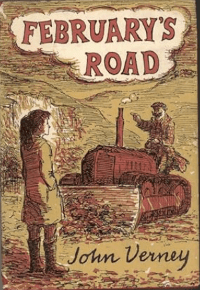(You can listen to this episode here.)
Mary Grace introduces Deborah to John Verney’s 1961 novel February’s Road. It’s the second volume in a series about the large and eccentric Callendar family. In this book, 13-year-old February Callendar unearths skullduggery involving plans to build a road through her family’s property.
Other books by John Verney mentioned on the episode:
Friday’s Tunnel (1959), also narrated by February.
Ismo (1964), told from the point of view of February’s sister Gail. It’s the only book in the series that’s told in the third person.
Seven Sunflower Seeds (1968), narrated by February’s younger sister Berry.
Samson’s Hoard (1973), also narrated by Berry. This book doesn’t seem to have been published in the United States and Mary Grace didn’t read as a child.
Going to the Wars (1955), Verney’s well-regarded memoir about his experiences in World War II.
A Dinner of Herbs (1966), the follow-up to Going to the Wars.
Also mentioned:
Mary Grace mentions The Arm of the Starfish (1965) by Madeleine L’Engle, which, like the Callendar family books, involves young people involved in international intrigue.
Mary Grace and Deborah talk about the word “zany,” used on the covers of our old copies of both February’s Road and (less accurately) Harriet the Spy, which we discussed on a previous episode.
You can check out Verney’s illustrations in an electronic copy of February’s Road on HathiTrust (it’s unclear why, since it’s still under copyright). The link goes to an illustration where February’s father is throwing the mail up in the air in disgust.
A post about February’s Road on the blog Clothes in Books, which includes a comment by Verney’s son Sebastian saying that the character Mike Spillergun’s name was a reference to the comedian Spike Milligan. (This post includes one of Mary Grace’s favorite passages, where February and her frenemy Helen are giving each other the once-over at a party.)
Several commentators have noted the similarity between Verney’s illustrations and those of Edward Ardizzone, a well-known British illustrations. The striking similarity can be seen in a self-portrait by Ardizzone.
Other art of Verney’s, along with a photograph of his family, can be found here.
Mary Grace mentions an obituary in The Independent that says that Verney could have been a significant artist if not for his experiences in World War II.
As Mary Grace mentions, Verney devoted much of his later life to work on historic preservation with the Farnham Trust. There is a post on the Farnham Trust’s website about a centenary lunch in honor of Verney. It includes a photograph of Verney’s wife, children, and grandchildren.
Mary Grace mentions that this is the third episode featuring a British writer who devoted a lot of time to historic preservation. The other episodes were on Alan Garner’s The Owl Serviceand L.M. Boston’s The Children of Green Knowe.
The writer Jojo Moyes said in a 2011 Daily Mail interview that Friday’s Tunnel was the book that first gave her the reading bug.
Mary Grace says that, after reading the Callendar family books as a child, she went on to be a fan of Margaret Drabble’s early novels. Her favorite was The Millstone, published in 1965.
Deborah mentions Ballet Shoes, the subject of a previous episode, as one of her favorite British books when she was a child.
Mary Grace recalls how much she enjoyed the British words and expressions in Verney’s books as a child and bemoans the practice of adapting British books, including the Harry Potter books, for an American audience. This website provides a list of words and phrases that were changed in the Harry Potter books—“sweets” to “candy,” etc.
Mary Grace mentions the discussion on the episode on Pippi Longstockingon recent edits to that book’s text.
Deborah recommends the Madeleine L’Engle books to fans of February’s Road, since they take place in a similar time period and involve government secrets.She and Mary Grace discussed L’Engle’s classic A Wrinkle in Time on a previous episode.
Mary Grace says that fans of February’s Road may enjoy Nancy Mitford’s novels The Pursuit of Love and Love in a Climate when they are older, since both are about large, eccentric upper-class British families.
The podcast is hosted by Buzzsprout at rereadingourchildhood.buzzsprout.com and is available on Spotify, Apple Podcasts, and other podcast platforms.
You can find Deborah’s author interviews on her blog, Books Q&A by Deborah Kalb, and Mary Grace’s adventures in the 1920s on her blog, My Life 100 Years Ago.
This episode was edited by Adam Linder of Bespoken Podcasting.

